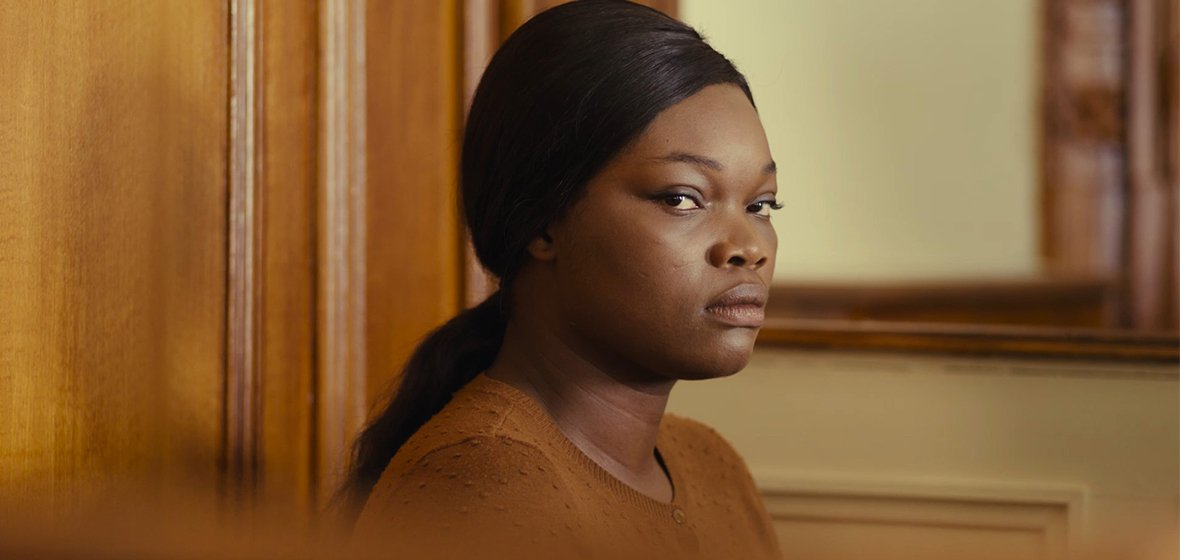In Saint Omer, a novelist researching her new book attends the trial of a mother accused of murdering her newborn. It’s a simple logline with a curious detail: there is a subject and a mystery but not much action. Saint-Omer isn’t the story of a mother proving her innocence. It’s the story of a woman watching, as the audience does, the trial of another woman. Bear with me; there is more to this. This film is a triumph.
The novelist is Rama (Kayije Kagame), and she attends the trial of Laurence (Guslagie Malanda) to frame the case on a modern retelling of the Greek myth of Medea. Laurence, a student and Senegalese immigrant, left her daughter on a beach to be taken by the waves of the rising tide. Why would a mother do this? Laurence’s answers are vague and mysterious. Everyone, from the judge to the barristers, and even we, the audience, work hard to fill in the gaps of her complex personality. Laurence talks about “dark forces” with the same ease as she describes her life as an immigrant in France. Still, her answers are articulate and reasonable, only her crime causes the viewer to guess if there is a psychological issues. We think we know the truth because we apply our own experiences to Laurence, but the presence of Rama reminds us of the context we’re missing.
Like Laurence, Rama is Senegalese (or rather, her mother is). Pregnant with her firstborn, she attends the trial with a preconceived idea of Laurence’s guilt and reasoning – Medea is a myth about a woman who sacrifices everything around her, including her children, for the man she loved. But the trial triggers in Rama memories of her mother. It helps a woman battling her generational trauma around motherhood to confront her own issues. As the trial continues and a finding of Laurence’s guilt seems unavoidable, the idea of guilt and innocence becomes muddied by the social context. Justice is, in the end, an impersonal concept. Even Rama has no right to judge Laurence, and she understands her better than we do.
Saint Omer is the first fiction film from French-Senegalese filmmaker Alice Diop. It’s based on a similar trial Diop attended while pregnant. The script uses actual transcripts from the trial, and Diop positions the camera with a reverence for the message: no artifice and very few cuts. The shot lingers on a character’s testimony to give the audience the purest experience of passing judgement without external influences. Though that is impossible – personal experiences are enough to sway our opinion – Diop films it like it is.
The exception to this treatment is the character of Rama. A vehicle for Diop’s presence at the trial, her presence adds complexity to the film’s heavy message. She’s not just an observer; she has an emotional reaction that may be different from yours, as it should be.
It is the sense of burden that permeates the film’s fabric. The burden of motherhood. The burden of being an immigrant – a good immigrant, knowing what you do can influence how the country will see your community. The burden of being part of a culture that has almost disappeared after centuries of oppressive colonialism. And the burden of the isolation that this brings.
There are few films like Saint Omer. Cinematographer Claire Mathon (who also shot Portrait of a Lady on Fire) finds that perfect balance between the trial’s natural style and the almost dreamlike sequences of Rama’s memories.
Malanda has the most challenging task. She has to perform the role of a complex woman whom no one can fully understand. Her eyes pierce as we try to understand what this means – if, in fact, it means anything at all. It’s one of the strongest performances I’ve seen all year.
Diop has justified making this film a work of fiction, though heavily influenced by an actual situation, instead of a documentary as she has in the rest of her career. It’s a stylistic choice that adds an electrifying charge to a film that is more than just “procedural court drama”. Godard once said cinema is truth at 24 frames per second. Saint Omer pursues that truth incessantly.
Verdict: 5 out of 5
For those who find the justice system a flawed necessity. And everyone still dealing with the trauma of post-colonial aggression.




